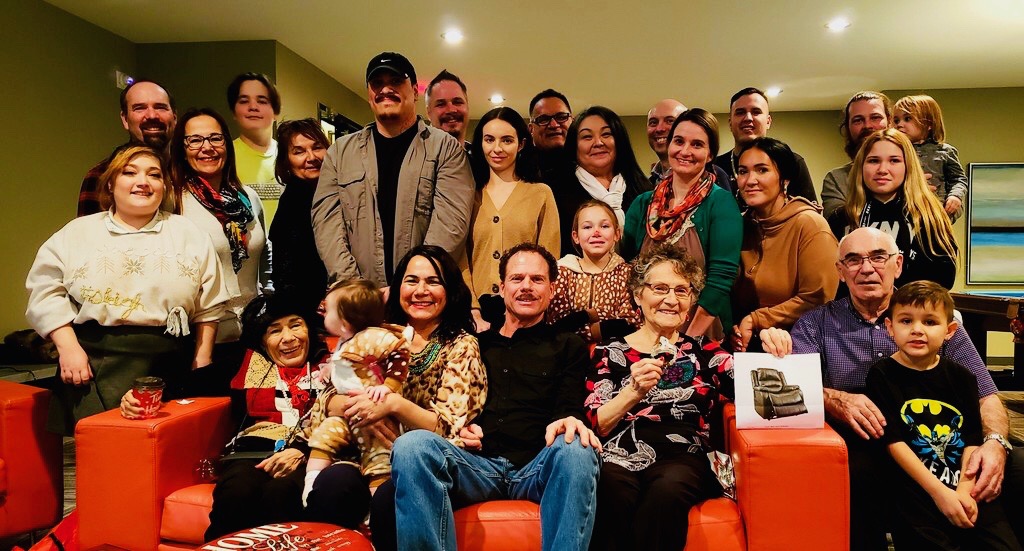(Photo: Monica Goulet and her family at Christmas time following her kidney transplant surgery, provided by Monica Goulet)
March is National Kidney Month, and today, March 13, is World Kidney Day.
A study done by the National Library of Medicine in 2022 highlighted inequities in kidney care for Indigenous people in Canada. The study indicates that Indigenous Canadians experience worse clinical and patient-oriented outcomes compared with the general population.
The inequities are more pronounced in the more rural and northern parts of the country. MBC Radio News spoke with advocates for kidney disease, including Monica Goulet from Cumberland House, who received a kidney donation from her nephew, and Crystal Marinak of La Ronge, who donated a kidney to her now husband.
Monica Goulet’s story:
Monca Goulet lived the majority of her life with kidney issues, as she was born with a genetic defect that she inherited from her mother. There’s a valve that controls the flow of urine from the kidney to the bladder, and since birth that valve was not working properly in Goulet’s right kidney.
It wasn’t until she was older and living in Saskatoon when a general practitioner told her she had problems with her kidneys. When she was in her twenties, her right kidney was only functioning at about 5%, and at the age of 24, she had that kidney removed.
“I lived quite comfortably with one good kidney for quite a number of years, and until I got stage four kidney disease,” she said.
Goulet then found out that she needed a kidney donor, and her sister, son, and multiple friends and family members did not meet the criteria to be a perfect match. Eventually she found out that her nephew Jim Searson was a perfect match, and he offered to go through with the kidney transplant surgery, which she said was a feeling unlike anything else.
“It’s the second-best gift I’ve ever received. The first was the gift of life, and this one was my second chance at life. So, you can’t fully express how that feels until you have that experience yourself,” she explained.
Goulet now spends her time as a passionate advocate and advisor for people experiencing kidney disease, particularly in the northern and rural parts of the province. She has held multiple fundraising events through her grassroots philanthropic organization, Sasipenita, and most recently was appointed to a national committee to advocate for northern Indigenous patients going through the organ transplant process.
Crystal and Darwin’s story:
Crystal Marinuk has a son with type one diabetes and a partner with kidney disease. She describes her personal conflict when she got the news that she was a match with her fiancé.
Her oldest son was diagnosed with type one diabetes at just four years old, and her partner was also diagnosed with type one diabetes at quite a young age.
Type one diabetes, along with high blood pressure, is one of the leading causes of kidney failure.
When Marinuk met her partner later in life, he had already been diagnosed with kidney disease and was suffering from kidney failure. She described it as an extremely emotional experience because she knew it was a possibility that her oldest son could experience kidney failure later in life.
Her partner was on the waiting list to receive a new kidney, and in the back of her mind she thought, “What if there was a chance that I matched?”
It’s extremely rare to find an exact match for a kidney transplant, even though relatives and, in some cases, people wait years to receive a kidney from a deceased donor.
“I just thought, you know, I don’t—I can’t—I need to have an answer. I need to know, you know, there’s always that little, tiny possibility, and I also thought about what was next for him, which was dialysis treatment, and that would mean it would be an eight-hour trip, three times a week, where he would be hooked up to a machine that would filter out his blood, and that would be for the rest of his life until he found a kidney,” she explained.
Marinuk decided to start the process of becoming a potential donor, which included making sure their blood type matched, she was healthy enough, lengthy questionnaires, and multiple trips to the doctor.
“We got to the final test, which is called a cross-match, and it was very nerve-wracking, but we made it that far; it was probably about maybe four to five months overall,” she said.
When she got the call and found out that she was a perfect match for her partner, she was overjoyed. At the same time, the news weighed heavy on her as she was scared that her oldest son may need a kidney transplant in the future, and there was a possibility she could match with him as well.
“I asked my son what he thought about it, and I wanted his input, and I wanted to know what his feelings were about it, and he said to me, ‘Mom, why are you even questioning it? If you can save somebody’s life right now, why would you not do that? Why are you even thinking twice?’” she explained.
From there, Marinuk and her partner went through with the kidney transplant surgery and had a 100% success rate.
Now Marinuk and her partner dedicate their time to helping other northerners who are battling kidney disease. They both promote organ donation in the north and drive northerners to and from dialysis appointments in the south.
After everything she and her partner went through, they ended up getting married last summer.
(Photo: Crystal and Darwin at their wedding last summer, provided by Crystal Marinuk)
During National Kidney Month, Marinuk and Goulet both want to remind people to take care of their health and educate themselves on kidney disease.
“I would just like to remind people how important the kidneys are, that they’re your lifeline, and you get one set of them. Sometimes you run into illnesses like this, and you’re very, very fortunate if you’re given that second chance at life, and that’s what it is. It’s a second chance at life when a person donates a kidney, or the person receives a kidney,” said Marinuk.
“The people that are waiting for kidney transplants, that’s the highest number in terms of organ transplants that are needed. So, they make up about eighty-five percent all across Canada. So, you know, think about your own families, think about the people around you, and think, ‘What can I do to help? What can I do to stop this? What can I do to prevent this epidemic from growing any bigger?’” stated Goulet.
Below are links to the full length interviews with Goulet and Marinuk.

